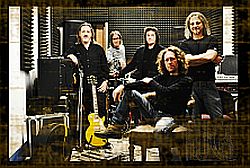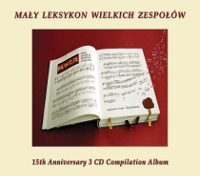"Europa Minor": an interview with Pietro Contorno (Tugs)
 Europa Minor is your debut album, but your on the scene from many years: how does it feel to finally arrive to a discographical release?
Europa Minor is your debut album, but your on the scene from many years: how does it feel to finally arrive to a discographical release?
Pietro Contorno: I would say that we are all pleasantly “dazed”. This artistic and professional experience cannot be compared to the others...
The Tugs were born in the second half of the seventies, when prog-rock in Italy still had a meaning, counting many live performances trough out the eighties, when this genre disappeared, and debut whit an album just today. What are the main differences that you have found in your way?
PC: This is the point. A large part of the music contained in this work belongs to the seventies: in fact it was thought and written between 1978 and 1981. Years in which music genres suffered less labelling and more contaminations. We played prog whitout knowing, or better whitout naming it like this. We were a teen group, drenched of humanistic cultur and we spilled our music with our interests, our passions and visions. Everyone (more or less) was doing the same thing in our environment, not caring about trademarks (anche qui non sono convinto) or a disco-graphical goal.
Today, and maybe it is a good thing, we all have a “project”. All groups, even the youngest, have precise ideas. They self-promote, produce demos and self-produce albums, they spread their work on the web. That's all good... But maybe it often happens that the creative aspect is obscured by the “project” which becomes much more important then the work that is proposed.
A rock opera dedicated to Europe. A very delicate subject, very actual and intricate: what kind of interpretation you gave of our continent?
PC:We believe it is necessary to create a united front against the prevailing idea of a mere Financial and Commercial Union of our continent, that is causing a lot of damage. The reasons of our “being together” reside in our millenary culture that joins us all, forged by an impressing series of struggle for emancipation, ideality, sacrifices and unfortunately wars, including to world conflicts. What we intend to say is that our “being together” is named literature, cinema, balley, poetry, music and not spread. We must reclaim our common roots. We all bear a great culture and on which we must consolidate our common sense. We're not being chauvinists o Eurocentric, ours is a noble tradition but not only or best one. Simply one trough many. That's why we added the diminutive Minor next to the word Europa (Europe). A culture between thousands of cultures.
The title of the album inevitably recalls the first LP by Mauro Pagani: as well as PFM what are your influences, your loves and the references that characterize your progressive music?
PC: That disc by Mauro Pagani is in our hearts. And that Mediterranean and Arabian taste that represent contamination, a melting pot of sounds. The correct sense of closeness to the others (non sono convinto, fai te).We don't listen to prog from almost 25 years, and for many reasons: professional, evolution of the music taste and even... esistential reasons. But within our group there is a real conflict between lovers of this genre. We are still discussing on the conflict Yes vs. Genesis, but we have a few names on which all the band agrees and on which our work resounds: first of all PFM, then Jethro Tull, Camel, Mike Oldfield and others. But what we have surely never lost, specially in our lyrics and vocal melodies, was a certain song-writing style which recalls De Andrè, Branduardi and, less consciously, Le Orme.
The main feature of your style is this songwriting/folk atmosphere, so different from most of the prog bands: how important is for the tugs to be story tellers?
PC: This question touches me deeply since i'm the author of our lyrics. Well, let's start from the fact that in my life I never wrote what I felt but mainly what I thought. And this for the simple fact that I don't consider my feelings so extraordinary to be worthy of a song. Different thing for what I think. The lyrics of “Voglio” a song by Eugenio Finardi comes to my head, the repetition of the words: “i think that, I believe that...” It's a thing that mainly concerns the political culture of the seventies. Taking the responsibility of what we think, what we say and what we represent.
There are emotional and personal experiences in the lyrics which are diluted, hidden or encrypted within more “formal” openings (non mi piace, cosa intendi dire per aperture). I'm thinking of the song “La brigata dei dottori – The doctors brigade” that above it's showy title, it talks about the difficult relationship we all had with a lost friend that shared those hard years with us. We tell of the first teenage love in “Il Pianto – The Weeping”, but more than a Him and Her we talk of how to reconcile private and pubblic or, how we used to say in those times, personal and politic. Anyhow most of our songs are stories like “Nanou” or “ Canzone per un anno – Song for a Year”, little tableaus that have birth thanks to our love for De Andrè, and again “I bambini d'inverno – The winter's child”, which lyrics i'm very fond of, that immagines two groups of kids playing separated from a wall. I wrote it thinking of the wall in Berlin, still up in those days, but we could place it in the palestine of our times. The world changed a lot in the last twenty years, but walls still seem to resist.
After a break of a few years there has been your reunion, in which you rearranged some of your old songs: the tracks of Europa Minor are part of the historical material of the Tugs? What's new in the album?
PC: Well, few years it's more like an euphemism, after 25 years... The musical compositions are absolutely vintage, but those of us that brought on their artistic carrier took inside our project all their experiences. We wanted to make our youth musical dream come true: we dreamed violins, flutes, mandolins, and cellos that in our young days we could not afford. We played with the most miserable technical equipment in a triangular room (non so come tradurti fondo). Really. Our working space was composed of just three walls, the sound was horrible and some tones resounded just into our heads. This required us to a great composing effort so that our sound could be effective and in some ways “bearable”. Now all the colours we dreamed of are there: a little orchestra of ten elements with which we enjoyed to create sound just like a painter mixes the colours. The chisel work made by Marco Susini, our keyboarder, with the sounds and tunes on the orchestration of our tacks has been fantastic.
In the eighties the difficulties for those who played prog music forced you to concentrate on the live performances and so you gave birth to the rock opera Rock in two acts: what are the differences with Europa Minor?
PC: Rock in two acts was an obliged step. With national and international discographies that where plasticized and synthesized, it was impossible to present yourself to any label. The only chance was to dodge trough the market and try to insert music into a visual context. After all the reasons are the same. The difference is 15 years of theatrical experience matured by some of us and a structure like the one of the Todomodo Music-ALL company that allowed us to enrich and deepen the subjects we propose.
The rock opera it's a typical staging of the sixties-seventies, from Tommy by the Who to The Wall by Pink Floyd, classical rock soaked itself with “electric musical theatre”, what about today? Does it still make any sense to stage this kind of show?
PC: It's our bet. But we ask ourselves: what music genre bound in a better way the visual arts, the iconographical suggestions, the visualization of sound? Surely the risk of being rhetorical or being stereotypical is very high. We do use stereotypes in our live performances but it's a path of research that we chose: we summed them up in the this format called Europa Minor.
Who ever listens to the CD or the vynil of Europa Minor can make their own idea of what could be your live performance: what are the features of the Tugs Concerts?
PC: There is a little “sound” contextualization in the album. The songs are linked one to the other by sounds, ambients and are practically mixed together. Flipping the pages of the booklet that is released on both CD and vinyl can help, but surely assisting at a live performace of Europa Minor is a totally different thing. Europa Minor is a clandestine live. An initiation rite. A musical and literature chest that open up just for the few persons that attend the show. The idea is of an escaping, menaced, threated, forgotten culture. The great works we mention (Cervantes, Dostoevsky, Remarque, Pasolini) have become, unfortunately even in the reality of facts, subcultures that are cannibalized by massified and classified contemporary artistic forms. We try to revive them for a few hours. Stories and characters. You'll surely understand that representing this iconographical context in an album isn't easy at all.
Europa Minor is a very important album since it faces very delicate subjects: art, music, little and big stories of the European landscape. What listening advice would you give to who get close to this work for the first time?
PC: The dream for all those that worked with passion on a project like ours is that those who get close to our work give a non superficial listening. The disc is long but very various in the genres and sound ambients that we propose. There are many melodic alternatives to the soloist vocal or instrumental line.
Advice: evening, headphones, medium volume at the first listening. Then the contrary, maybe the on-car cd reader. I believe Europa Minor can stand either a detailed (I remember that inside the album there are many instruments: violins, cellos, flutes, percussions, mandolins, mandola, oud, acoustic and electric guitars, etc...) or a rough listening.
We wish to everyone (and we hope there will be many) to enjoy Europa Minor.






